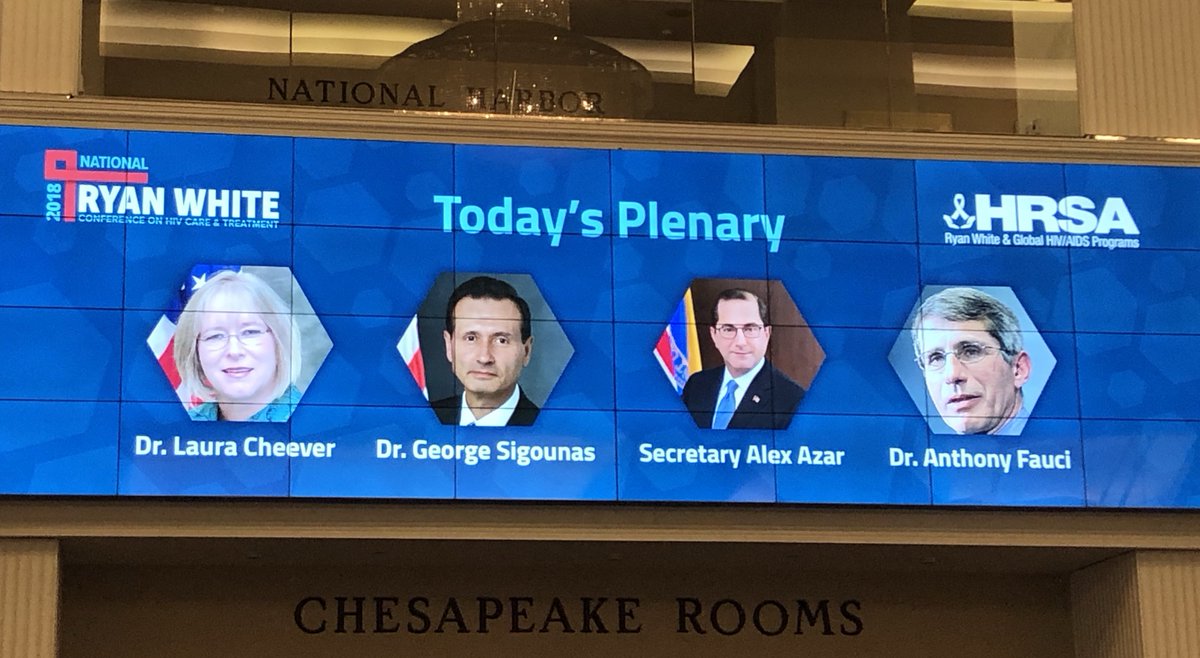Day 1 Recap: 2018 National Ryan White Conference on HIV Care & Treatment
Topics

More than 4,000 HIV care and treatment leaders, Ryan White HIV/AIDS Program recipients, subrecipients, stakeholders, planning bodies, people living with HIV, and those on the front lines providing direct care to patients convened today for the 2018 National Ryan White Conference on HIV Care & Treatment kickoff at the Gaylord National Convention Center at the National Harbor in Oxon Hill, MD. This year's conference includes four plenaries, over 240 workshops, eight institutes, 184 poster sessions, and an array of auxiliary meetings on special topics critical to the work of HRSA's Ryan White HIV/AIDS Program (RWHAP). The theme for the Health Resources and Services Administration's (HRSA) HIV/AIDS Bureau (HAB) funded and sponsored National Conference is "Catalyzing Success: Advancing Innovation. Leveraging Data. Ending the HIV Epidemic."
HHS Leaders Open National Conference on Day One
The 2018 National Ryan White Conference opening plenary session featured a panel of federal leaders from across the U.S. Department of Health and Human Services (HHS) who highlighted the success of HRSA's Ryan White HIV/AIDS Program, the challenges that lie ahead, and the Department's efforts to end the HIV epidemic.
Dr. Laura Cheever, Associate Administrator for HRSA HAB, provided a "first look" at the latest data demonstrating continued improvements in viral suppression, as reported by 2,000 RWHAP recipients and compiled in the 2017 Annual Ryan White HIV/AIDS Program Client-Level Data Report [PDF< 3.8MB] released yesterday. Among the key findings:
- In 2017, 85.9 percent of RWHAP clients receiving HIV medical care achieved viral suppression. This is a 16.4 percent increase since 2010, continuing a years long improvement, said Cheever, "and is significantly higher than the rate of 59.8 percent viral suppression among all those diagnosed with HIV in the U.S."
- The demographics of RWHAP are changing. People are living with HIV longer, and those who comprise a greater proportion of those receiving RWHAP services are aged 45 years and older—around 60 percent – or a 10 percent increased from 2010.
- Disparity gaps have been reduced markedly with across-the-board improvements in viral suppression across states, racial/ethnic populations, gender, and age.
- Despite progress, disparities persist, particularly in southern states.
(See related blog post.)
HRSA Administrator Dr. George Sigounas spoke about the agency's strategic goals, and said that the RWHAP has transformed what was once a deadly disease to a chronic but manageable condition through a comprehensive system of HIV care. "You are the local, state, and national leaders translating the latest science into practice, providing direct patient services and using data to drive services and deliver HIV care." He concluded by observing that there are a significant number of people "who are out of care and undiagnosed who need our care and support," restating HRSA's commitment to increasing access to HIV services to end the HIV epidemic.
HHS Secretary Alex Azar shared that the "frontlines of the fight against HIV" are where Ryan White HIV/AIDS Program recipients work everyday, and he thanked attendees for their dedication to this challenge. During his presentation, Azar announced his nomination of two new chairs for the President's Advisory Council on HIV/AIDS (PACHA) – Carl Schmid and John Wiesman. Carl Schmid is the deputy executive director of the AIDS Institute, and John Wiesman is the Commissioner of Health for Washington State. Azar told attendees that PACHA will reconvene and will meet in March 2019.
The powerful plenary session concluded with a presentation by Dr. Anthony Fauci, Director of the National Institutes of Health's (NIH) National Institute of Allergy and Infectious Diseases (NIAID), who outlined the "scientific basis for the bold assertion that we can end the epidemic, sooner than later." Fauci outlined the extraordinary advances that have been made in HIV care, and he shared that the results in the RWHAP are "better than any program in existence today." (See related post from NIAID.)
Stay Connected to #RyanWhite2018
Want to stay connected to the 2018 National Ryan White Conference on HIV Care & Treatment? Follow HRSA on Twitter: @HRSAgovExit Disclaimer.
You can also stay up-to-date on the latest conference happenings on HRSA's Facebook pageExit Disclaimer and catch conference highlights on HIV.gov's Facebook Live.Exit Disclaimer